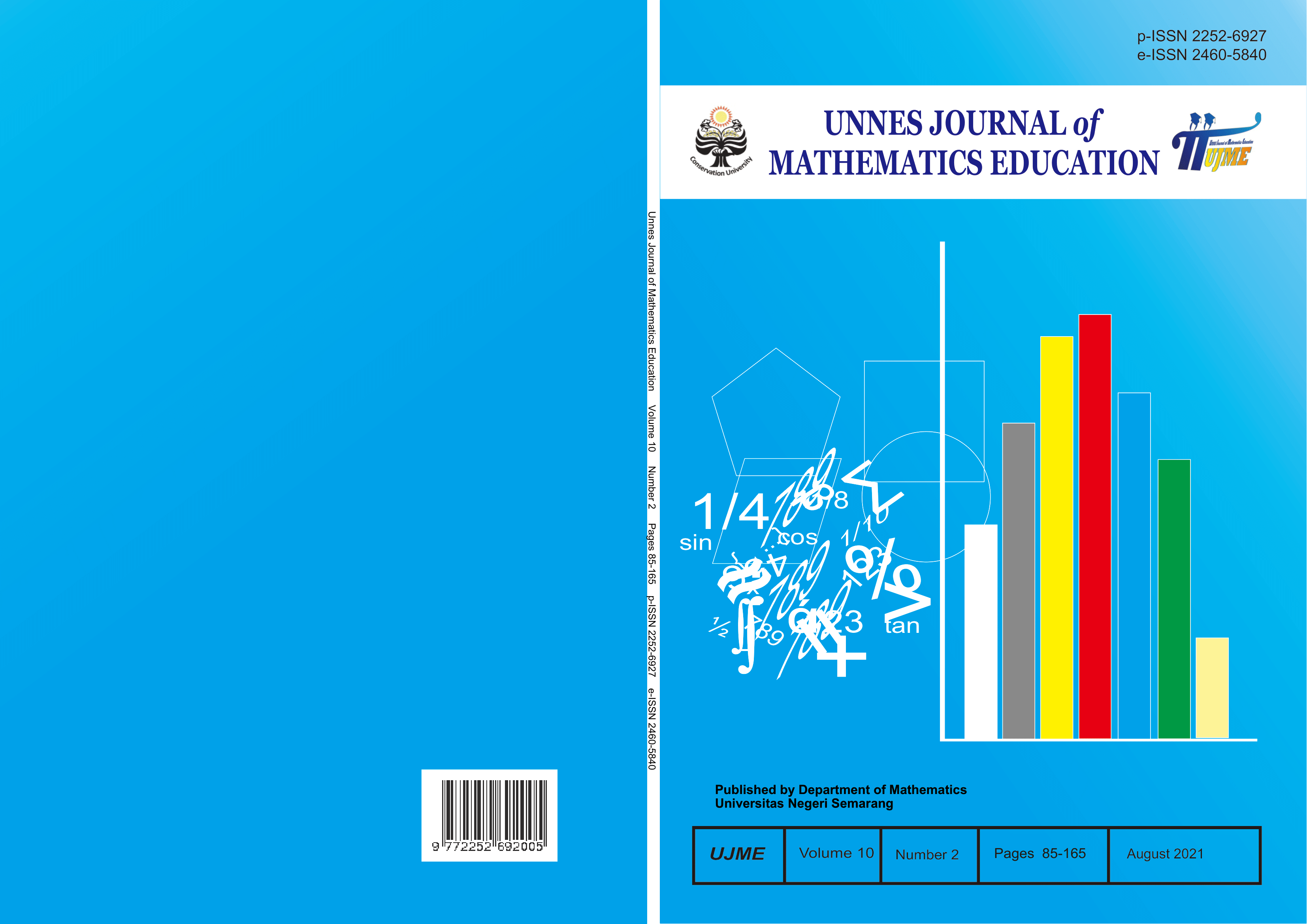Mathematical problem solving ability of 8th grade students in terms of adversity quotient using discovery learning
##plugins.themes.academic_pro.article.main##
Abstract
The purpose of this research was to (1) find out the completeness of mathematical problem-solving abilities of 8th-grade students in Discovery Learning; (2) description of mathematical problem-solving abilities aspects of 8th-grade students who have a climbers types; (3) description of mathematical problem-solving abilities aspects of grade 8th students who have a campers types; (4) description of mathematical problem-solving abilities aspects of 8th-grade students who have a quitters types. This research is mixed methods using a sequential explanatory model. The design is a one-shot case study. The sample class is 8D. Research subjects consisted of 2 students of climbers types and 4 students of climbers types. The results showed that (1) mathematical problem-solving abilities of 8th-grade students in Discovery Learning achieved classical and individual completeness; (2) climbers students can solve all of the problem-solving indicators; (3) ) campers students can solve three of problem-solving indicators; (4) quitters students were not found in this research so couldn’t be described.
##plugins.themes.academic_pro.article.details##
References
Ardiansyah, A.S. (2018). Kemampuan Berpikir Kreatif dan Belief in Mathematics Siswa dalam Setting Challenge Based Learning Ditinjau dari Adversity Quotient. Tesis. Universitas Negeri Semarang.
Chotimah, N. H. (2014). Pengaruh Model Pembelajaran Generatif (MPG) Terhadap Kemampuan Pemecahan Masalah dan Disposisi Matematis Siswa di Kelas X pada SMA Negeri 8 Palembang. Skripsi. Universitas PGRI Palembang.
Dahlan, J. A. (2014). Analisis Kurikulum Matematika. Jakarta: Universitas Terbuka.
Hema, G. & Gupta, S.M. (2015). Adversity Quotient for Prospective Higher Education. The International Journal of Indian Psychology, 2(3): 49–64.
Karatas, I., & Baki, A. (2017). The effect of learning environments based on problem solving on students’ achievements of problem solving. International Electronic Journal of Elementary Education, 5(3), 249-268.
Peraturan Menteri Pendidikan dan Kebudayaan Republik Indonesia Nomor 58 Tahun 2014 Tentang Kurikulum 2013 Sekolah Menengah Pertama/ Madrasah Tsanawiyah. (Decree of The Indonesian Minister of Education and Culture Number 58, 2014)
Lefudin. (2017). Belajar dan Pembelajaran. Yogyakarta: Deepublish.
Mawaddah, N., & Hana, A. (2015). Model Pembelajaran Discovery Learning dengan Pendekatan Metakognitif untuk Meningkatkan Metakognisi dan Kemampuan Berpikir Kreatif Matematis. Unnes Journal Of Mathematics Education Research, 4(1).
NCTM. (2000). Principles and Standards for School Mathematics. Amerika: The National Council of Teachers of Mathematics, Inc.
OECD. (2016). PISA 2015 Results in Focus. OECD
Paramita, L.W. (2017). Kemampuan Komunikasi Matematis Ditinjau dari Adversity Quotient Melalui Penerapan Model Pembelajaran SSCS pada Siswa Kelas VIII. Skripsi. Semarang: Universitas Negeri Semarang.
Polya, G. (1973). How to Solve It: A New Aspect of Mathematics Method. New Jersey: Princeton University Press.
Stoltz, P.G. (2007). Adversity Quotient: Mengubah Hambatan Menjadi Peluang. Translated by T. Hermaya. Jakarta: PT Grasindo.
Sudarman. (2012). Adversity Quotient: Kajian Kemungkinan Pengintegrasiannya dalam Pembelajaran Matematika. AKSIOMA, 1(1): 55–62.
Sugesti, F. E., Budiyono, B., & Subanti, S. (2014). Eksperimentasi Model Pembelajaran Kooperatif Tipe Structured Numbered Heads (SNH) dan Two Stay Two Stray (TSTS) dengan Pendekatan Realistic Mathematics Education (RME) pada Prestasi Belajar Matematika Ditinjau dari Adversity Quotient (AQ) Siswa. Journal of Mathematics and Mathematics Education, 4(1), 1–10.
Syaiful. (2012). Peningkatan Kemampuan pemecahan masalah matematis Melalui Pendekatan Pendidikan Matematika Realistik. Edumatica, 2(1). 36-44.
Wicaksana, H., & Usodo, B. (2016). Eksperimentasi Model Pembelajaran Problem Based Learning (PBL) dan Discovery Learning (DL) dengan Pendekatan Saintifik pada Materi Himpunan Ditinjau dari Adversity Quotient (AQ) Siswa. Jurnal Elektronik Pembelajaran Matematika, 4(3), 258–269.
Yuliani, K., & Saragih, S. (2015). The Development of Learning Devices Based Guided Discovery Model to Improve Understanding Concept and Critical Thinking Mathematically Ability of Students at Islamic Junior High School of Medan. Journal of Education and Practice, 6(24), 116-128.
